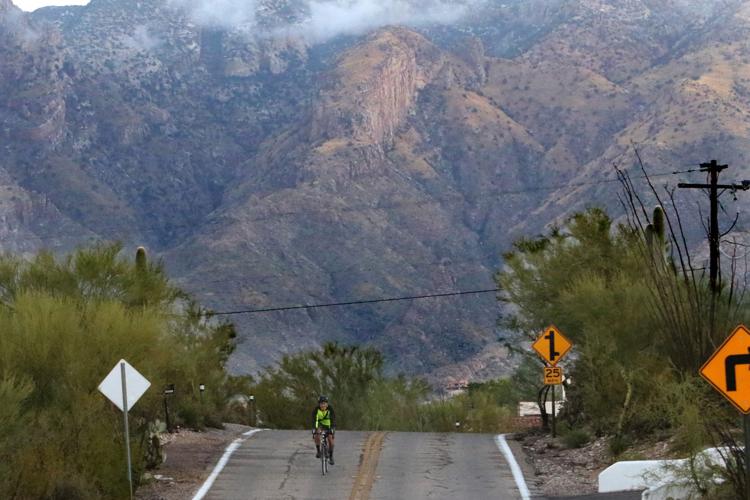If President-elect Donald Trump wants to reform health care in the U.S., he might do well to consult Tucson physician Dr. Paul Gordon.
Gordon, 61, this year cycled 3,255 miles over three months, listening to Americans talk about the Affordable Care Act (ACA), which is also known by its unofficial yet popular name, “Obamacare.”
The University of Arizona College of Medicine Tucson professor expects to publish some of his findings and observations in academic journals.
A lot of people he met along the way were parroting sound bites, Gordon found. Others said they don’t want to pay for other people’s health care. At the same time, he found the people he encountered were kind and generous with sharing their thoughts, with offers of help to fix flat tires, and to provide lodging and meals.
“We heard stuff that was not present in the survey data,” said Gordon, who rode through rural areas of Maryland, Pennsylvania, Ohio, Michigan, Wisconsin, Minnesota, South Dakota, Montana, Idaho and Washington state.
Some people he met liked the fact that young adults can stay on their parents’ health insurance until the age of 26; that insurance companies can no longer deny them coverage due to pre-existing conditions; and that federal subsidies are available to help people pay for insurance. But others had no idea those three things all happened as a result of the ACA and are part of the law.
Anger
“Given what we heard, I wasn’t all that surprised with how the election went,” said Laurel Gray, 26, medical student who accompanied Gordon on part of the ”Obamacare Listening Tour” to assist with research. “The anti-ACA lobby was very effective at painting an inaccurate picture of what the legislation is.”
A lot of people were angry, she said.
“When you are passing through these rural areas and seeing the reality of what life is like and what it has been like for the past 10 years, it’s very different. I hadn’t realized what a bubble I’d been living in, in Tucson.”
Gordon, who teaches and practices family medicine, and his wife, Tucson pediatrician Dr. Eve Shapiro, have long been supporters of universal health care. That means they’d like to see all Americans have equal access to health care through a single payer system.
But that’s not what the Obamacare Listening Tour was about.
“I never corrected. I just listened. By listening I quickly gained their sense of trust,” Gordon said. “I was just there to listen, not judge.”
Between three and eight people were riding with Gordon at any given time, including Shapiro, his two grown children and Gray, the UA student, who was a social worker before she went back to school to become a physician.
Misinformation
Gordon recalls how much a musician he met in rural Ohio disliked the individual mandate, which was part of the 2010 law, that all Americans have health insurance. The musician doesn’t mind that car insurance is mandatory because owning a car is optional. But being alive isn’t optional and that’s why mandating health insurance is unfair, he told Gordon.
Gordon also tells the story of a hotel manager he met in Knoxville, Maryland who hasn’t seen a doctor in a long time, even though he has employer-sponsored health insurance. He finds the system too complicated, so he avoids it.
And then there was Henry, the South Dakota resident who told Gordon that Obamacare “sucks” but wasn’t clear on the details of it.
“There was so much misinformation,” Shapiro said. “It was sound bites. Everything was Obama’s fault.”
She also noticed a large number of people who, “hate government telling them what to do.”
Complicated system
Gray went through her own learning curve.
“This was my first year needing my own health insurance. I’d always been on my parents’ plan,” she said. “When I started the tour I was embarrassed by my huge gaps in knowledge. I learned a lot.”
Some people Gray met said they could not afford health insurance. In some cases, though, she wondered whether health insurance was not their financial priority.
One certainty Gray took back to school this year, where she is a second year student, is that medical students have an obligation to be politically informed about the system in which they operate.
Gordon and Gray never set up any of their talks with people in advance. Typically they would ride for a few hours and stop at a convenience store along the way, get something to eat or drink, and talk to the people there.
The “Obamacare Listening Tour” jerseys the team wore invited conversation. Gordon and Gray would then dictate and summarize what they’d heard as a voice memo, which they later transcribed.
“At a minimum it informed me of people’s understandings of health insurance and health in general,” Gordon said. “And it helped me to be a better teacher and practitioner. A great lesson is that of listening. We need to listen to our patients. We can’t necessarily fix it, but we can at least listen.”
Gordon himself was never a fan of Obamacare because it includes the insurance industry, and much of the insurance industry is a business that prioritizes its stockholders.
In a single payer system, physicians can still be independent but there’s not another layer of overhead and administrative costs, he explained.
“Health care is complicated. But when you have a single payer system it’s not complicated at all,” he said.
“Damn politicians”
Gordon recalls a 75-year-old woman he met in Spokane, Washington who had similar sentiments as she drank a beer and watched a baseball game.
“Health care is a right,” he recalled her saying. “It’s true. Just raise taxes … But the damn politicians don’t have the balls to raise taxes.”
At this point, no one can predict what will happen to the Affordable Care Act moving forward. But Gordon says it will be hard to remove some of the pieces people don’t like, such as the individual mandate, without increasing costs.
Next up: Gordon would like to cycle across Canada to hear from Canadians firsthand what they think of their health system. He’s interested in doing the same in Taiwan, which also has a government-run single payer system.







